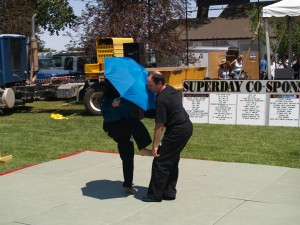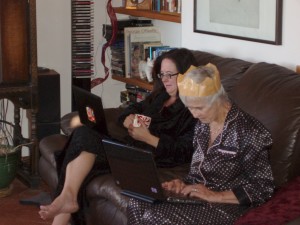 I love how the setting sun is exactly cradled between these two peaks of the Jemez mountain range. Useful to know, in case my calendar breaks.
I love how the setting sun is exactly cradled between these two peaks of the Jemez mountain range. Useful to know, in case my calendar breaks.
So, you all know that one of the genres I write is erotica, particularly BDSM. I get asked a fair amount why I chose that brand of kink and I have to say that I didn’t. It chose me. I’ve noticed, in fact, that even when I’m not writing BDSM, the essential elements of it do creep in. Power exchange, intimacy, vulnerability, giving up control. When writers talk about voice, they often give the advice to pay attention to your themes, that your stories will tend to cluster around certain ideas. I almost always write about transformation of some kind and the elements of power and control usually play into that.
Since I’ve published some of this work, especially the more explicit BDSM, I’ve noticed that there’s a contingent of authors and readers who want to critique the writing in terms of verisimilitude. I’ve seen reviews and comments that people who aren’t “in the lifestyle” shouldn’t, or can’t, write about it. I see authors proudly discussing their participation in BDSM activities and citing these credentials. I’ve seen them criticizing other authors for not having, or not displaying, their credentials.
Now, this is not something I talk about. Just as in my stories, I’m a believer in privacy and intimacy. What goes on in my personal sex life is not relevant to my writing. I see no reason to discuss what I may have or have not done. Really, I don’t see why any of you would care. The characters in my stories are much more interesting – and look better naked.
I find it disconcerting then, to see other BDSM authors trotting out their credentials and saying that, unless an author has done these things – and is willing to openly discuss their own sex lives – they can’t write about it. This is patently absurd reasoning. By this line of thinking, only people who have been serial killers can write about those villians. Only master spies can write espionage novels. It totally screws all the historical and speculative fiction authors – we might as well eliminate those genres altogether.
Dan Savage, whose column I read faithfully and who I greatly admire, says that the BDSM community tends to be particularly bad about the You’re Doing It Wrong syndrome. He says in this column (scroll down to the second letter):
YDIW is a social-skills disorder that members of the BDSM community are at particular risk of acquiring. (Others at heightened risk: religious conservatives, sports fans, advice columnists.) BDSMers with YDIW feel they have a right to inform other BDSMers that they’re doing it wrong—whatever it might be—even if the “it” being done wrong poses no risk to the YDIW sufferer or anyone else.
I don’t know why this attitude flourishes in the community so much, but it does seem to. The most insidious part is, the YDIW finger pointers claim that they “can tell” whether someone has experienced something personally or not. This seems to fly in the face of the whole concept of becoming a good writer. If you hone your craft and are faithful to the story, the author should become invisible. There should never be a sense of the author intruding into the character’s lives. When reading A.S. Byatt’s Possession, the reader doesn’t speculate on whether the author has been a male Victorian poet. We all know that Jane Austen died a spinster and never experienced the love affairs she wrote about so compellingly.
When that invidious advice gets circulated, to “write what you know,” nobody ever means that you should write only those things you’ve directly experienced. That would pretty much pull the plug on all fiction. No, instead it means to draw on those themes you understand in your heart. Human experience is universal. We know how we feel in x situation; we can take that understanding and draw on it to imagine how another situation would feel.
This is what people refer to as art.
Otherwise we might as well just videotape our lives and send those out as stories instead.
Oh wait. People already do that.
At any rate, that’s my take. Unless an author is providing a how-to guide, a “Learn to Bake an Angel-Food Cake Just Like I Do!” guide, then it’s just not relevant to question how good their angel-food cake is. There’s a good chance the cake is just a metaphor anyway.
Which is nice, because you can both have and eat a metaphorical cake. And you’re not even doing it wrong.








